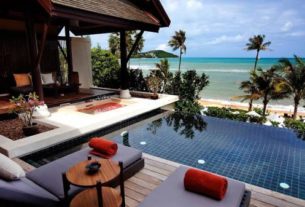Thailand takes top spot in HSBC’s Expat Explorer Survey 2011: we look at its broad appeal for expat retirees
Many months ago I suggested to a leading British Sunday newspaper that they produce an updated look at where Britons are retiring abroad. I’d worked with the journalist in question a year or so before on a similar piece, but in the meantime I’d noticed a distinct and remarkable trend in Britons particularly interested in retiring to countries like Thailand.
The Sunday newspaper in question was wholly disinterested in my new emerging retirement abroad hotspots however; they felt they didn’t fit their Dordogneshire/Chiantishire demographic and were wholly sceptical about my research and findings.
Well, bully for them! Because thanks to a sneak preview of the forthcoming 2011 Expat Explorer survey from HSBC, I can reveal that Thailand takes top spot in terms of both its economic and lifestyle factors and benefits for expatriates. But why Thailand? What is it about this nation that is suddenly currying so much favour with expats?
Tax Free Thailand
One of the main reasons for Thailand’s great appeal for many who are planning on retiring, or at least living in Thailand and not deriving an income locally, is that they can live there 100% tax-free – legitimately.
According to the Thai Revenue Department: –
“A resident of Thailand is liable to pay tax on income from sources in Thailand as well as on the portion of income from foreign sources that is brought into Thailand.”
Therefore, even those expats who become permanent residents in Thailand by meeting their 180-day residency rule can retain all their wealth offshore and legitimately avoid paying any local taxes. Naturally enough this ensures any pension income, or any money derived from investments offshore or ‘back home’ such as a rental property for example, will go an awful lot further without the deduction of income tax.
If a Briton wants to move to live in Thailand and be considered a Thai resident for income tax purposes they must complete HMRC’s P85 form, and in so doing apply to the British Revenue to be considered non-resident and not ordinary resident for tax purposes.
The criteria they have to fulfil in order to be considered thus is defined by HMRC as: –
“If you leave the UK…you are treated as not resident and not ordinarily resident if you meet all the following conditions; –
“Your absence from the UK and your employment abroad both last for at least a whole tax year
“During your absence any visits you make to the UK total less than 183 days in any tax year, and average less than 91 days a tax year. (The average is taken over the period of absence up to a maximum of four years. Any days spent in the UK because of exceptional circumstances beyond your control, for example the illness of yourself or a member of your immediate family, are not normally counted for this purpose.)”
And according to the Thai Revenue Department, a permanent resident in Thailand is “any person residing in Thailand for a period or periods aggregating more than 180 days in any tax (calendar) year.”
Low Cost Thailand
Whilst the days of living in Thailand’s party towns for just a few hundred pounds or dollars a month are definitely gone, you can still live in Thailand for much less than you might pay for a comfortable retirement in the UK for example.
Look on a myriad of forums for arguments about the cost of living locally, and the one thing you will see most people agreeing on is that you have to live in Thailand for at least a year or two to get the lay of the land and to ensure you’re not overspending on services and goods!
You need to settle in and get to know the ‘right’ people and the ‘right’ places to shop or dine, drink or socialise before you can ensure you’re living on the least amount comfortably possible – but you can definitely find a more affordable cost of living in Thailand.
You have to pick your location carefully of course, and perhaps resist the temptations to party that are really in your face 24/7 in some of the resorts, but if you’re careful and cautious, your western pension income can go a very long way.
You do need to factor in the likes of healthcare and the fact that odd costs can come along and blindside you occasionally! You also need to factor in the cost of a flight home occasionally and the fact that as a foreigner you will always be charged a bit more than local citizens…but with your eyes open and your head screwed on, you can live for much less in Thailand.
Decent Living Standards in Thailand
One of the other exceptional draws of Thailand for many who’re contemplating retirement or early retirement is that the standard of living can be fantastic. The climate and geography are conducive for outdoor living – the beaches are of course legendary and the nightlife and social side of life in many of the main resorts and cities are excellent.
It’s normal to have domestic help, and it can be very affordable too – and dining out on fantastic fresh, healthy local food is not only enjoyable, it’s also relatively affordable so that even the most cash strapped expats can indulge every once in a while.
Thailand is a nation that attracts expats from all nations and all walks of life. Yes, there are the bands of single males on the hunt for a beautiful wife, but there are plenty of western couples and families all living happily in Thailand too.
It’s a friendly, welcoming country where red tape can be lived with, and where there are always plenty of people to help you settle in and make your new life everything you dreamed of.
We’re not at all surprised that Thailand is topping HSBC’s Expat Explorer survey for 2011 – it’s a fabulous nation that ticks many boxes for many would-be expats. The full results of the survey are out in November.
Source: http://www.shelteroffshore.com/index.php/2/thailand-tops-hsbc-expat-explorer-2011-11121

